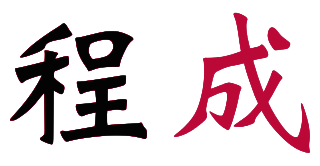Related Research Articles

Cheng can be a transcription of one of several Chinese surnames. Since the syllable Cheng represents different sounds in Hanyu pinyin and the Wade–Giles systems of Chinese romanization, some ambiguity will exist as to which sound is represented by the letters "Cheng" if the romanisation and tone is not known. Also within each system of romanisation, each syllable can represent one of several different characters, as with any Chinese syllable.
Tsui is a surname. It is an alternative transcription of two Chinese surnames, namely Cuī (崔) and Xú (徐).
Lui is a surname in various cultures. It may be a variant spelling of two Chinese surnames, as well as an Italian surname. The surname Lui can also be found on various Pacific Islands.
Mok is a surname in various cultures. It may be a transcription of several Chinese surnames in their Cantonese or Teochew pronunciations, a Dutch surname, a Hungarian surname, or a Korean surname.
Toy is a Chinese, English, and Turkish surname.
Chin is a surname. As a Chinese surname or Korean surname, it could originate from various Chinese characters, and it is also a surname in other cultures as well.
Kan is a surname of multiple origins.
Hui is a surname. It is the Hanyu Pinyin spelling of two Chinese surnames, as well as a variant spelling of two others.
Hing is an English surname, as well as a spelling of various Chinese surnames based on their Southern Min or Cantonese pronunciations.
Toh is a surname in various cultures.
Chia is a surname. It is a Latin-alphabet spelling of various Chinese surnames, as well as an Italian surname.
Loi is a surname. It has various origins, including as a spelling of three Chinese surnames, a traditional surname from Sardinia, and a surname in India from the word loi meaning "scheduled caste" in the Meitei language.
Ching is a Chinese and English surname.
Thong is a Chinese and Cambodian surname.
Yung is a surname in various cultures.
Chew is a Chinese, English or Korean surname.
Shum is a surname in various cultures.
Kam is a given name, nickname or surname.
Gan is a surname. It may be a Latin-alphabet spelling of four different Chinese surnames, a Korean surname, and a surname in other cultures.
Eng is a Chinese, German, and Scandinavian surname, as well as a given name in various cultures.
References
- ↑ Hanks, Patrick; Coates, Richard; McClure, Peter, eds. (2016). The Oxford Dictionary of Family Names in Britain and Ireland. Oxford University Press. p. 484. ISBN 9780192527479. The other surname Chéng ( 程 ) is homophonous with 成 in Mandarin but not in Cantonese, and when based on the latter is usually spelled Ching (Yale: Chìhng; Jyutping: Cing4; IPA: /t͡sʰɪŋ²¹/).
- ↑ Hanks, Coates & McClure 2016 , p. 2447
- ↑ Hanks, Coates & McClure 2016 , p. 2447. For the Teochew pronunciation, see Fielde, Adele M. (1883). "辛". A pronouncing and defining dictionary of the Swatow dialect, arranged according to syllables and tones. Shanghai: American Presbyterian Mission Press. p. 488. Additionally see "辛". mogher.com. Retrieved 11 January 2018.
- ↑ Hanks, Coates & McClure 2016 , p. 1291. Also romanised as Hsing in the Wade–Giles system used in Taiwan, and Shyng in the less-common Gwoyeu Romatzyh system.
- ↑ "Shing". Nederlandse Familienamenbank. Centrum voor familiegeschiedenis. Retrieved 8 September 2018.
- ↑ "How common is your last name?". Newsday. Retrieved 5 September 2018.